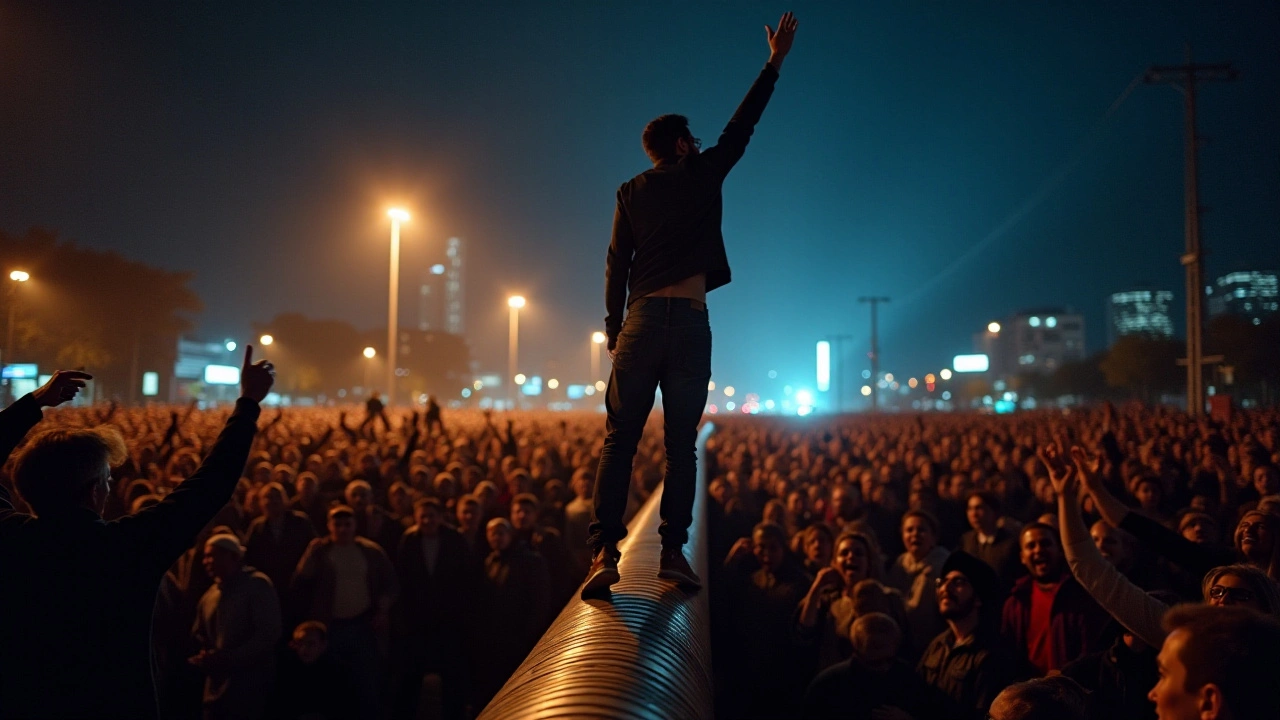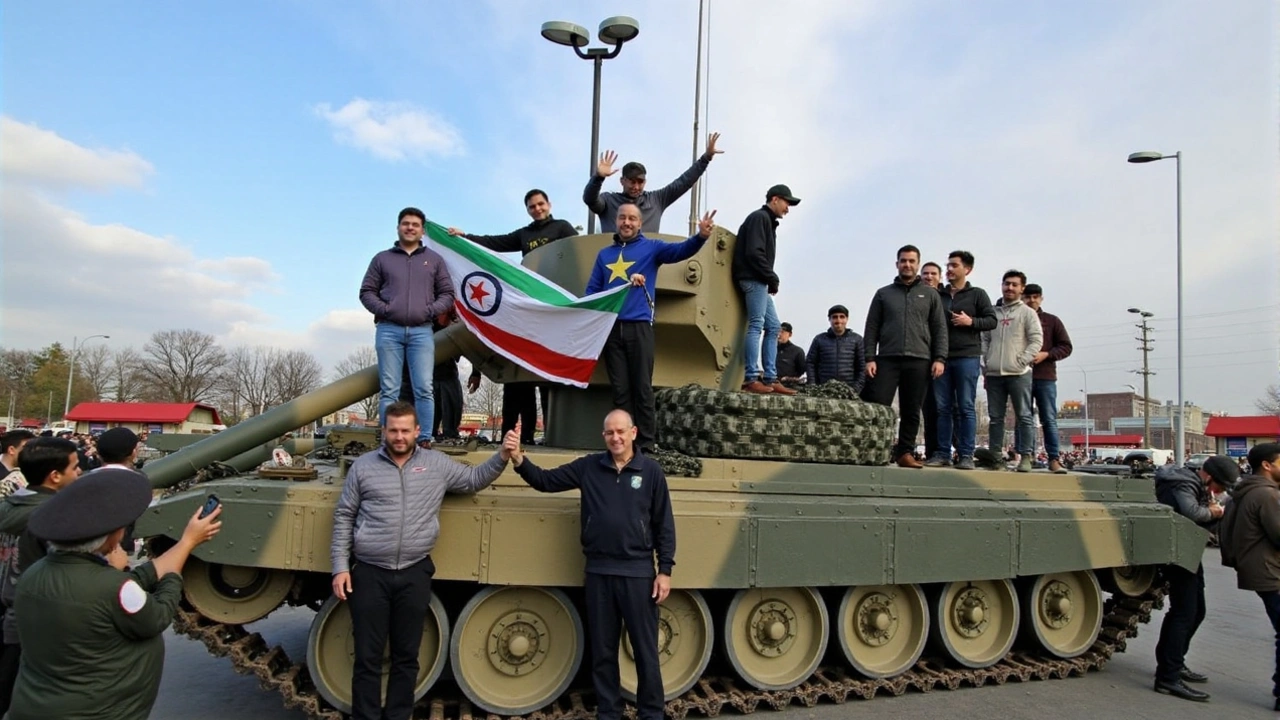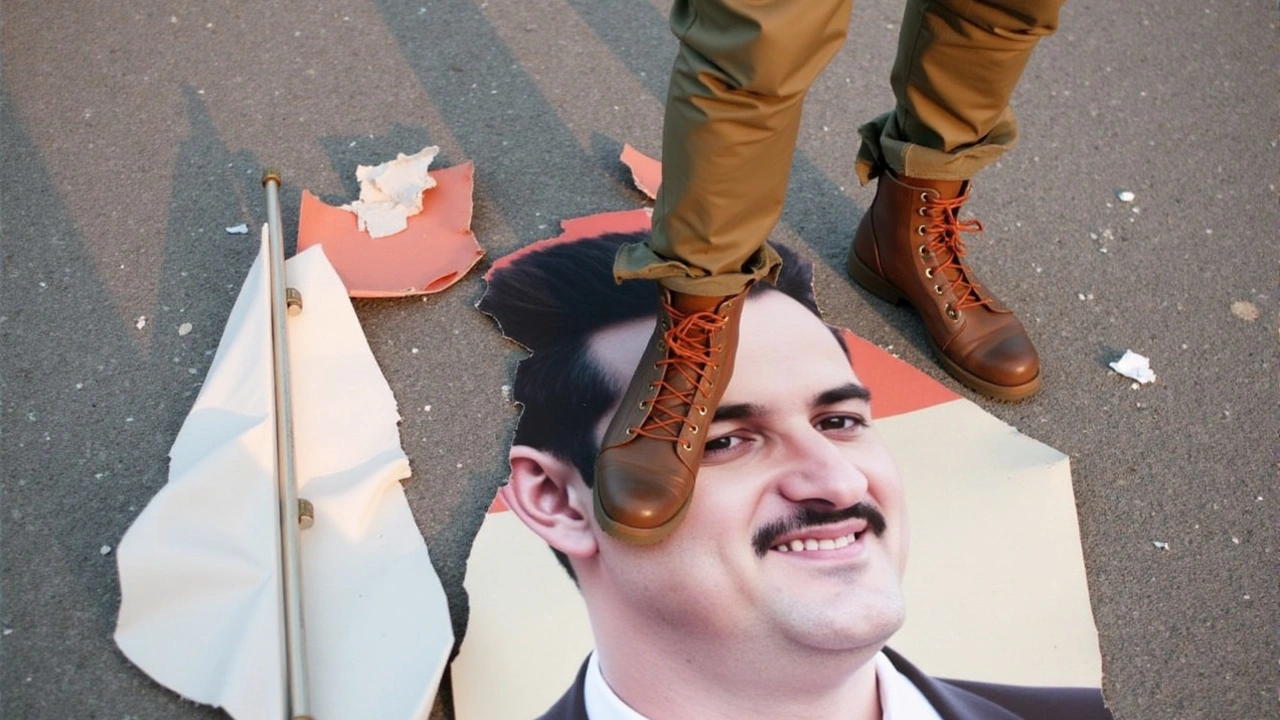Syrian Rebel Forces Seize Control of Damascus
The landscape of the Syrian civil war has undergone a profound shift as rebel forces stormed into the capital city of Damascus, signaling a pivotal moment in the country's longstanding conflict. On Sunday, December 8, 2024, the rumble of victory resounded through the streets of the capital, with reports quickly circulating that President Bashar al-Assad had departed the city, leaving his rule in question. The rebels, led by Hayat Tahrir al-Sham and the Syrian National Army, executed a bold and rapid offensive throughout the nation, securing the once-thought impenetrable capital.
The strategic capture of Damascus followed closely on the heels of a decisive victory in Homs, Syria's third-largest city. Situated at a crucial crossroads between Damascus and the crucial coastal provinces of Latakia and Tartus, Homs' fall was declared by the insurgents just the day prior. The city's takeover has been heralded as a game-changer, dramatically altering the dynamic of the conflict and boosting the rebels' momentum toward Damascus.
Assad Flees and Government Response
As news of the rebels' advance spread, reports indicated that President Assad took flight from the capital to an undisclosed location, an assertion confirmed by leading entities such as the Syrian Observatory for Human Rights and senior Syrian army officers. In a rapidly evolving situation, the Syrian army command reportedly informed its officers that Assad's tenure had concluded, rendering them effectively out of service.
Meanwhile, Syrian Prime Minister Mohammed Ghazi Jalali made a striking announcement as the unfolding events unfurled. In a televised address, he extended a proverbial olive branch to the opposition, stressing the government's willingness to transition its authority to a new governing body. Jalali's appeal was underscored by a critical call for citizens to maintain public order, despite the rapidly changing power dynamics sweeping through the nation.

The Rebels' Path to Power
The momentum of the rebels' push was visibly evident as they faced little opposition from the Syrian army en route to Damascus. Eyewitness videos circulating on social media platforms underscore the mostly uncontested nature of the advance, members of the rebel groups were seen entering the presidential palace, chanting affirmations of victory as they moved through a symbol of Assad's long-standing governance.
Given the sweeping extent of the rebels' takeover, the insurgent coalition has announced its intention to convene a transitional governing body, marking what could be the beginning of a new era in Syria's tumultuous history. As the rebels assert control over 12 of Syria's 14 provincial capitals, the government remains a presence only in Latakia and Tartus.
Releasing Prisoners and Navigating the Aftermath
Along with their territorial gains, the insurgents declared a mass release of prisoners from various regime prisons, including the infamous Saydnaya military prison. This move is part of the rebels' broader effort to dismantle the vestiges of Assad's regime and foster a new order within Syria's ravaged landscape.
International voices, notably including Anwar Gargash from the United Arab Emirates, have weighed in on the situation, urging cooperative measures among Syrians to stave off potential chaos. With thousands of citizens fleeing the upheaval, the ongoing crisis has sent shockwaves throughout the region, intensifying the decades-long civil strife.

A Future in Flux
The repercussions of the rebels' victory and Assad's departure herald a time of profound uncertainty for Syria. As diplomatic callings echo across borders and diaspora communities scramble to grasp the burgeoning power shift, conversations regarding Syria's next chapter abound. In the coming weeks, the newly declared transitional body stands to make crucial decisions that will shape the fabric of governance and society for years to come.
The events unfolding in Syria reflect a nation on the brink of transformation. As the rebels solidify their hold, capturing cities and rallying for a new Syria, the international community watches closely. This pivotal juncture is an opportunity but also a challenge, as the fragile threads of peace, negotiation, and hope hang delicately in the balance.

Sienna Ficken
December 8, 2024 AT 13:05Well, look who's finally decided to vacate the palace – guess the curtains finally fell for the biggest reality‑show in the Middle East. If Assad actually left, the power vacuum might sprout faster than a desert cactus, and the rebels will have to decide whether to water it with hope or artillery. For those wondering about the logistics, the Syrian army’s chain‑of‑command will probably dissolve faster than a sugar cube in tea, so expect a scramble for trucks and radios. In any case, the next few weeks will be a masterclass in how quickly a regime can go from omnipotent to obsolete.
Zac Death
December 17, 2024 AT 16:40The fallout from a capital takeover is never a tidy affair, and everyone from the street vendors to the foreign diplomats will feel the tremors. First, the immediate scramble for power means that ministries that once reported to a single office will now be shouting into the void, trying to locate a new chain of authority. Second, the security vacuum invites not only hopeful citizens but also opportunistic militias who see a chance to grab neighborhoods and resources. Third, the international community will rush to issue statements, some sincere, others calculated, each trying to position themselves for the next round of aid or influence. Fourth, the rebel leadership, now flush with momentum, must transition from guerrilla tactics to governing, a shift that history has shown to be perilous. Fifth, the economic infrastructure, already battered by years of sanctions, will be tested as banks, utilities, and markets decide whose orders to follow. Sixth, the displaced populations returning home will need food, shelter, and medical care, a logistical nightmare for any provisional administration. Seventh, the media narrative will swing like a pendulum, with some outlets glorifying the "victory of the people" and others warning of impending chaos. Eighth, the legal framework will be in flux, as courts grapple with new judges and possibly the repeal of decades‑old decrees. Ninth, the Syrian army’s remnants will either dissolve quietly, integrate into new forces, or become a rogue element causing sporadic skirmishes. Tenth, the neighboring countries will monitor border crossings closely, fearing spillover of fighters or refugees. Eleventh, the regional powers, from Iran to Turkey, will recalibrate their support networks, perhaps opening new back‑channel negotiations. Twelfth, the humanitarian NGOs will scramble to reassess needs assessments, hoping to deliver aid before security deteriorates further. Thirteenth, the Syrian people themselves will have to decide whether to embrace the new order, resist it, or simply try to survive amidst the uncertainty. Finally, the world will watch, and the outcome will likely set a precedent for how entrenched regimes can be unseated in the twenty‑first century.
Lizzie Fournier
December 26, 2024 AT 22:53Hey folks, just a heads‑up that any power shift will need a lot of community input, so it’s not just about who’s in the palace. The rebels will have to think about essential services – water, electricity, health – before they can claim a clean slate. Remember, even a casual chat with locals can reveal what’s really needed on the ground. Let’s keep the conversation respectful and grounded.
JAN SAE
January 5, 2025 AT 05:06Wow!!! The speed of this takeover is just mind‑blowing!!! How many troops actually stayed behind??? Who’s really pulling the strings??? It’s a whirlwind of events, and everyone seems to be shouting at once!!!
Steve Dunkerley
January 14, 2025 AT 11:20From a strategic‑operations perspective, the dissolution of the centralized command hierarchy will precipitate a decentralization of control nodes, necessitating rapid reallocation of logistics assets. Moreover, the engagement rules for coalition forces will have to be recalibrated in line with the new territorial control matrices. The humanitarian sector must also integrate real‑time intel to avoid duplication of effort. In essence, the operational tempo is expected to accelerate dramatically.
Jasmine Hinds
January 23, 2025 AT 17:33Wow this is huge 😮 lots of hope for the people 😃 can't wait to see how things turn 🌟
Madison Neal
February 1, 2025 AT 23:46While the transitional council promises reforms, the implementation framework will need robust governance protocols, stakeholder alignment, and sustainable financing mechanisms. Without a clear roadmap, the risk of institutional fragility remains high. It’s crucial that civil society voices are embedded in policy drafting to ensure legitimacy. The road ahead is steep but not insurmountable.
John Crulz
February 11, 2025 AT 06:00Curious how the international legal community will interpret the legitimacy of the new governing body-will they recognize it under existing UN charters or call for a fresh mandate? Also, what happens to the existing civil‑military agreements that were signed under Assad’s regime? These questions could define the next diplomatic roundtables.
Anita Drake
February 20, 2025 AT 12:13It’s important to acknowledge the diverse experiences of Syrians across the country; many have endured years of hardship and now look toward stability. The transitional process should aim for inclusivity, ensuring that all ethnic and religious groups have a seat at the table.
Eduardo Lopez
March 1, 2025 AT 18:26Behold, a new chapter unfolds before our very eyes, a saga that could rival the grandest epics of history! The streets of Damascus echo with chants that tremble the walls of the old regime, heralding a momentous shift in power. Yet, let us not be blinded by spectacle; the real work begins behind the curtains where governance, justice, and hope must be painstakingly rebuilt.
Nancy Perez de Lezama
March 11, 2025 AT 00:40It is quite surprising that such a swift change could occur in the capital. The government’s response will need to be measured and clear. Citizens deserve stability and clear guidance during these times.
Matt Heitz
March 20, 2025 AT 06:53The recent upheaval is a stark reminder that external meddling has long propped up a corrupt regime, and now the Syrian people reclaim their sovereignty. Patriotic forces must rally to protect the nation’s core values, rejecting any foreign agenda that seeks to destabilize our homeland. This is a pivotal moment to fortify national identity and to purge remnants of foreign influence from our institutions. Anyone who undermines this resurgence is deliberately betraying the Syrian cause.
Susan Mark
March 29, 2025 AT 13:06Perhaps the new administrators could consider forming advisory panels that include former officials to preserve institutional memory while still encouraging fresh perspectives. Such a balance might smooth the transition and reduce friction.
Jason Jennings
April 7, 2025 AT 20:20Honestly, this whole thing looks like a circus run by people who think they know better than the rest of the country. They brag about reforms but most of the time it's just the same old power play under a new flag.
Diego Vargas
April 17, 2025 AT 02:33Look, I’ve read dozens of reports on post‑conflict governance, and let me tell ya, most of them miss the point – you need a solid legal framework first, then you can worry about the rest. If they don’t set up proper courts, everything else collapses.
Alex Lee
April 26, 2025 AT 08:46The rebels are just a bunch of opportunists.
Vida Yamini
May 5, 2025 AT 15:00The sheer scale of what’s happening in Damascus is almost unimaginable it’s like watching a massive chessboard where every piece suddenly finds a new purpose it also shows how fragile political structures can be when they rely on a single leader the people now have a chance to rewrite the rules of engagement and maybe even heal some of the wounds that have festered for years the international community should step back and let Syrians themselves decide the next steps while still offering humanitarian support it’s a delicate balance but one that could set a precedent for future conflicts the more voices we hear from the ground the richer the solution will be and perhaps this could be the beginning of a more inclusive, stable future for Syria
James Lawyer
May 14, 2025 AT 21:13Given the present circumstances, could the provisional council issue a provisional constitutional amendment that delineates the separation of powers, thereby ensuring checks and balances from the outset? Moreover, what legal mechanisms will be employed to legitimize such changes under international law?
Abby Culbertson
May 24, 2025 AT 03:26i think the people just want peace not more war.